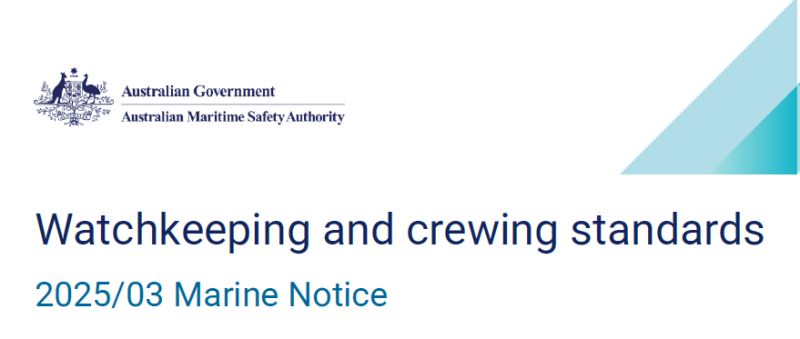
The Australian Maritime Safety Authority (AMSA) has recently issued updated guidelines on watchkeeping and manning standards, emphasizing the importance of ensuring seafarer fitness for duty and managing fatigue effectively. This notice applies to both Australian and foreign-flagged vessels operating in Australian waters.
Fatigue, both physical and mental, remains a critical safety hazard in the maritime industry. AMSA highlights that while the STCW Convention and MLC Convention set minimum rest time standards, they do not fully address the risks of fatigue. Factors such as sleep quality, circadian rhythms, environmental conditions, and the nature of the tasks can all contribute to fatigue, even when rest hours meet the minimum requirements. This can lead to decreased alertness, lower task efficiency, and impaired emergency response capabilities.
AMSA specifically calls out the widespread "6-on-6-off" watchkeeping schedule as a major contributor to fatigue. Research has shown that this shift arrangement leads to shorter, fragmented sleep, particularly in the early morning hours, causing excessive sleepiness and micro-sleeps. This schedule may not allow seafarers to meet the required 6 hours of continuous rest as per the STCW Convention and can affect the quality of watch handovers, leading to safety risks.
For example, an investigation into the Nathan E Stewart incident found that the officer on watch, who was on a 6-on-6-off shift, had experienced significant sleep and circadian rhythm disruption, contributing to the grounding of the vessel.
AMSA stresses that vessel owners and operators must demonstrate how they ensure compliance with the STCW’s watch handover and rest hour requirements, even when using the 6-on-6-off shift. Given the risks associated with this schedule, AMSA encourages operators to reassess their watchkeeping arrangements and explore alternatives that may better support seafarer rest and alertness.
AMSA has made it clear that violations of rest hour requirements or falsification of rest records will be met with strict enforcement. Vessels could face detention if rest hour records are found to be altered or do not meet the minimum STCW requirements. Additionally, compensatory rest used for non-emergency activities such as bunkering or port arrivals may also lead to violations.
AMSA further clarifies that “override operational conditions” under the STCW Convention apply only to essential operations that cannot be delayed for safety, security, or environmental reasons, and not to routine operational tasks.
by Xinde Marine News Chen Yang
Please Contact Us at:
media@xindemarine.com






